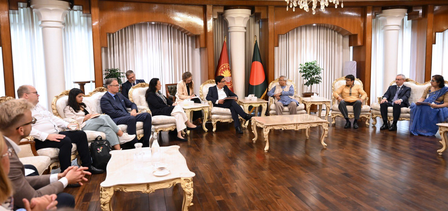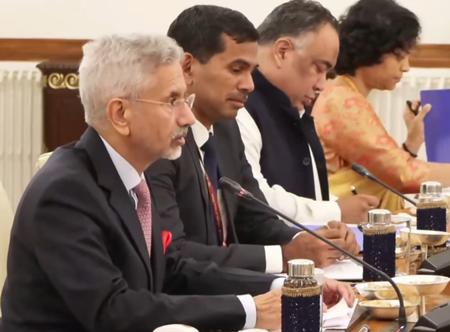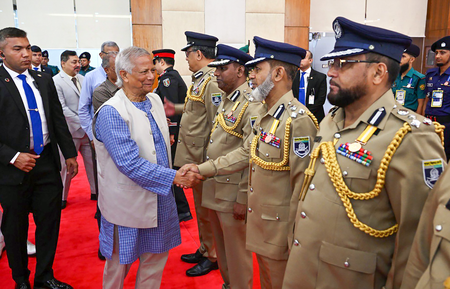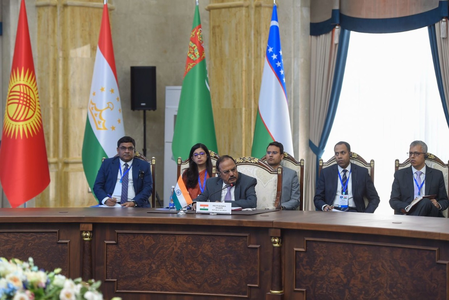
Dhaka: The visit of a European Parliament’s Subcommittee on Human Rights to Dhaka, which concluded on Thursday, came at a time when Bangladesh is facing a severe assault on democracy and fundamental rights under the Muhammad Yunus-led interim government. The EU’s five-member delegation visited Bangladesh from September 16-18 to assess governance reforms and the human rights situation in the country.
The five-member delegation of Members of the European Parliament (MEPs) was led by Mounir Satouri (Greens/EFA, France) and included Isabel Wiseler-Lima (EPP, Luxembourg), Arkadiusz Mularczyk (ECR, Poland), Urmas Paet (Renew Europe, Estonia) and Catarina Vieira (The Greens/EFA, The Netherlands).
The visiting delegation met with Foreign Affairs Advisor Touhid Hossain on Thursday after calling on Chief Advisor Yunus on Wednesday where the latter had reaffirmed his government’s commitment to holding a free, fair, transparent, and “festive general election” in the first half of February, next year.
“We have already announced the timeline for the election. It will be held in early February, just before Ramadan,” Yunus told the European delegation.
During the hour-long discussion, as the EU members emphasised that the upcoming election marks a critical moment for Bangladesh’s political transition, Yunus vowed to conduct the entire exercise in a “clean” and “transparent” manner.
The statement came at a time when the Yunus administration has banned the activities of the Awami League under the Anti-Terrorism Act. The country’s Election Commission has cancelled the party’s registration and even expressing support for the Sheikh Hasina-led party through rallies, slogans and social media posts has been criminalised by the interim administration.
Analysts reckon that if the EU is so committed and sincere then it should support credible, free, fair and inclusive elections in Bangladesh using its considerable influence on the Yunus government and pressing for immediate corrective action.
The Yunus administration has used arbitrary detention to target perceived political opponents and is yet to deliver systemic reforms to protect human rights.
The Bangladesh of today reflects a complex situation, interplay of domestic politics, personal rivalries and international influence. Operating illegally, Yunus has got the backing of the US and the West with his coterie of advisors at the centre of this maelstrom. These advisors have appeared to prioritise an ambitious reform agenda over the necessity of conducting timely elections, the bedrock of a democracy.
The Awami League still remains a powerful political force and poses a serious threat to other parties aligned to the Yunus administration, including the Bangladesh Nationalist Party (BNP), Jamaat-e-Islami (JeI), National Citizens Party (NCP), all of which fear a free and fair contest.
The Awami League’s de-registration and the ongoing harassment of its allies has eroded the faith in the democratic process.
In recent weeks, amidst a growing political violence across Bangladesh, the Jatiya Party office was attacked and then set on fire on September 5.
Yunus is adamant on erasing the Awami League, considered as the sole voice for Liberation of Bangladesh.
The reality on the ground is far from “good governance”. Bangladesh continues to face massive unrest. There are chilling signs of deepening economic crisis. The national poverty rate stands at 28 per cent in 2025. In 2022, it was 18.7 per cent. Survival has become a daily struggle for the country’s population but the Yunus government continues to shield syndicates and crush the needy.
As unemployment has risen to 6,80,000 in Dhaka alone, a staggering 84 per cent of the workforce remains trapped in the informal sector without social protection or fair wages. In rural areas, the number touches 87.58 per cent. Bangladeshis will continue to live with insecurity and face an uncertain future. Yunus and his inefficient team is destroying Bangladesh, its economy, youth and culture pushing millions toward despair.
(The writer is an expert on South Asia and Eurasia. He was formerly with Manohar Parrikar Institute for Defence Studies and Analyses. Views expressed are personal)
–IANS
/as




